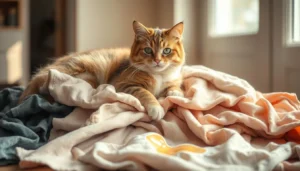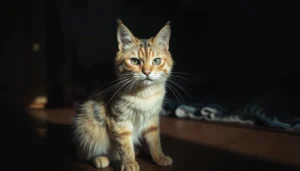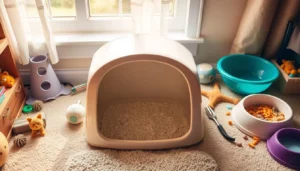You’ve just pulled out your favorite sweater, only to find a wet spot. This can be really upsetting. If you’re wondering why your cat pees on your clothes, you’re not alone.
Cat owners face many challenges with their pets’ bathroom habits. Your cat isn’t trying to upset you. There are deep reasons behind this behavior that aren’t just about being naughty.
Understanding these behaviors takes patience and kindness. Your cat might be trying to tell you something through peeing on your clothes. It could be a health issue, stress, or even marking territory. Let’s explore the real reasons behind this puzzling problem.
Understanding Why Cats Urinate Outside Their Litter Box
Cat behavior can be puzzling, like when they start urinating outside the litter box. Knowing why helps you fix this problem better. Cats use their bathroom habits to communicate in complex ways.
Decoding Cat Spraying vs. Inappropriate Urination
Cat spraying and inappropriate urination are different. Spraying is when cats mark their territory by leaving their scent. They do this by backing up to a vertical surface and spraying a small amount of urine.
- Spraying: Vertical surface marking
- Inappropriate urination: Random elimination outside the litter box
- Purpose: Communication vs. potential health issue
Natural Cat Instincts and Territory Marking
Cats are naturally territorial. They use scent glands to mark their territory. If they feel stressed or threatened, they might spray more to feel safe.
The Role of Scent Communication in Cats
Cats use urine to communicate. Understanding their scent language helps you know why they might pee in odd places. Stress, health problems, or changes in their environment can cause this.
Remember, every urination outside the litter box is a message from your cat waiting to be understood.
Why Is My Cat Peeing on My Clothes: Common Triggers
It’s frustrating when your cat pees on your clothes. Cat urine behavior problems come from many triggers. Knowing these reasons helps solve the issue and brings peace back to your home.
Stress is a big reason cats pee outside their litter box. Changes in your home can upset your cat’s mood. These changes might include:
- New pets or family members
- Recent move or home renovation
- Disrupted daily routines
- Loud noises or unfamiliar sounds
When you ask “why does my cat pee on my clothes?”, think about your cat’s feelings. Cats use scent to communicate. Your clothes smell like you, making them a good target for marking territory or getting attention.
“Cats don’t urinate on clothes to make you angry – they’re trying to communicate something important.” – Veterinary Behaviorist
Territorial instincts also play a part. Unresolved conflict with other pets or perceived intrusions can trigger inappropriate urination. Your clothes become a way for your cat to express their feelings.
Recognizing these triggers is the first step to fixing cat urine behavior problems. By understanding the causes, you can make your cat feel safer and stop clothes mishaps.
In Other Part If You’re Curious about other cat habits? Here’s a guide on why your cat might lick you and what it says about your bond.
Medical Conditions That Cause Inappropriate Urination
It’s key for pet owners to know why cats might pee in odd places. Cats can’t tell us when they’re sick, so peeing outside the box is a big warning sign.
If your cat is peeing outside the box, it could mean they’re sick. Many health problems can mess with a cat’s pee habits.
👉 Urinary Tract Infections and Kidney Problems
Urinary tract infections (UTIs) are a big problem for cats. These painful infections can make your cat pee a lot, pee in small amounts, or even pee blood.
- Experience frequent urination
- Show signs of discomfort while peeing
- Urinate in small amounts
- Exhibit blood in their urine
👉 Age-Related Health Issues in Cats
Older cats are more likely to get sick and pee outside the box. Problems like feline cognitive dysfunction can mess with their bathroom habits.
👉 When to Visit Your Veterinarian
Take your cat to the vet if you see:
- Persistent urination outside the litter box
- Changes in urine color or frequency
- Visible signs of pain during urination
- Sudden behavioral changes related to bathroom habits
Seeing a vet early can help fix your cat’s health and make them happy again.
Emotional and Environmental Stressors Affecting Your Cat
Stress can turn your home into a tough place for your cat. Cats are very sensitive and can get upset by changes. Knowing why your cat might pee outside the litter box starts with understanding what stresses them.
Many things in the environment can make your cat pee in the wrong place:
- Major household changes like moving to a new home
- Introduction of new pets or family members
- Disruptions in daily routine
- Conflicts with other cats in the household
- Loud noises or sudden environmental shifts
Cats use scent to talk to each other, and stress can make them pee more. When they feel scared or unsure, they might pee on your clothes. This isn’t mean—it’s their way of feeling safe.
Your cat’s unusual urination isn’t a personal attack, but a cry for help and understanding.
To fix the problem, make your cat’s world stable and predictable. Feed them at the same times, keep quiet areas, and make changes slowly. Being patient and understanding is key to helping your cat feel safe and stop peeing when stressed.
The Connection Between Dirty Litter Boxes and Clothing Accidents
When your cat starts peeing outside the litter box, it’s a sign of a problem. Dirty litter boxes can make cats pee on your clothes. It’s important to understand how clean litter boxes affect your cat’s behavior.
A clean litter box is key to stopping your cat from peeing on clothes. Cats are naturally clean and have specific preferences for their bathroom space.
Proper Litter Box Cleaning Techniques
Keeping your cat’s litter box clean can help prevent accidents. Here are some important cleaning tips:
- Scoop waste daily
- Deep clean the entire box monthly
- Replace litter completely every 2-3 weeks
- Use unscented, clumping litter
Selecting the Perfect Litter
Cats are picky about litter texture and smell. To stop your cat from peeing on clothes, try different litters:
- Soft, sand-like textures
- Unscented options
- Low-dust formulas
- Clumping varieties for easy cleaning
Strategic Litter Box Location
Where you place the litter box is important. Choose quiet, easy-to-reach spots away from busy areas. In big homes, have multiple boxes for easy access to a clean bathroom.
Pro tip: Cats like privacy and quiet when using their litter box. Don’t put it near loud appliances or stressful areas.
Effective Solutions to Stop Your Cat from Peeing on Clothes
Dealing with cat urine behavior problems can be frustrating. But, you have several effective strategies to stop your cat from peeing on clothes. Understanding the root cause is the first step in solving this challenging issue.
Start by creating a comprehensive approach to address how to stop my cat from peeing on my clothes through multiple targeted methods:
- Behavioral Modification Techniques
- Use positive reinforcement when your cat uses the litter box
- Redirect inappropriate urination with gentle corrections
- Environmental Enrichment
- Provide multiple clean litter boxes in different locations
- Create calm and secure spaces for your cat
- Stress Reduction Strategies
- Use calming pheromone diffusers
- Maintain a consistent daily routine
“Patience and consistency are key in resolving cat urination problems.” – Veterinary Behavior Specialists
Protect your clothing by making them less appealing for urination. Store clothes in closed hampers or drawers. Use deterrent sprays designed to prevent cat marking.
Consider consulting a veterinarian if these strategies don’t resolve your cat’s inappropriate urination. Professional guidance can help identify underlying medical or psychological issues contributing to this behavior.
How to Clean and Remove Cat Urine from Clothing
Dealing with cat urine on clothes can be frustrating. But, with the right approach, you can clean and save your favorite clothes. Cat urine problems often lead to unexpected laundry challenges that need special cleaning techniques.
When dealing with cat pee on clothes, act fast to avoid permanent stains and smells. The key is using the right cleaning methods and products. These should neutralize both the stain and the smell.
👉 Best Enzymatic Cleaners for Cat Urine
Enzymatic cleaners are your secret weapon against cat urine stains. They break down the proteins in cat urine, removing both the stain and the smell. Look for professional-grade enzymatic cleaners made for pet accidents.
- Nature’s Miracle Stain and Odor Remover
- Rocco & Roxie Professional Strength Stain & Odor Eliminator
- Simple Solution Pet Stain and Odor Remover
👉 Effective Laundry Techniques
To clean cat pee from clothes, follow these steps:
- Blot the urine stain immediately with a clean cloth
- Pre-treat the area with an enzymatic cleaner
- Wash clothes in the hottest water safe for the fabric
- Add a cup of white vinegar to the wash cycle
- Air dry and check for remaining odors
Pro tip: Never use bleach or ammonia-based cleaners, as these can attract cats and make cat urine problems worse.
Conclusion
Figuring out why your cat pees on your clothes can be tough. It takes patience, kindness, and a careful plan. By looking into medical, emotional, and environmental reasons, you’ve made a big step.
Every cat is different, and there’s no one-size-fits-all fix. The issue might be a health problem, stress, or not liking the litter box. Watching your cat closely and trying different things is important.
Getting help from a vet is key if things don’t get better at home. They can help find the cause and suggest treatments. Remember, fixing this problem takes time—be gentle with yourself and your cat.
Your effort to solve this problem shows how much you care about your cat. With persistence, understanding, and the right help, you can overcome this issue. This will bring peace back to your home.
FAQ
Why is my cat suddenly peeing on my clothes?
Cats pee on clothes for many reasons. It could be due to health issues, stress, or problems with the litter box. They might also pee on clothes to mark their territory or to communicate with you.
Could my cat’s inappropriate urination be a sign of a serious health problem?
Yes, it could be. Inappropriate urination might mean your cat has a urinary tract infection, kidney disease, diabetes, or bladder stones. If your cat is peeing outside the litter box a lot, see a vet to check for serious health issues.
How can I stop my cat from peeing on my clothes?
Try these steps to stop your cat from peeing on your clothes:
– Clean the litter box often
– Reduce stress at home
– Use pheromone diffusers
– Provide more than one litter box
– Make sure the litter box is quiet and easy to get into
– Check with a vet to rule out health problems
– Use enzymatic cleaners to get rid of urine smells
Is my cat peeing on clothes intentionally to get my attention?
Yes, it might be. Cats pee on clothes to get attention. It could mean they’re stressed, anxious, or need more interaction. It might also mean they feel neglected or are dealing with big changes.
How do I clean cat urine from my clothes effectively?
To clean cat urine from clothes:
– Blot the urine right away, don’t rub
– Use enzymatic cleaners for pet urine
– Wash in hot water safe for the fabric
– Add white vinegar to the wash
– Don’t use steam or high heat, it can set the stain
-If the smell stays, clean again
Could stress be causing my cat to urinate on my clothes?
Definitely. Cats get stressed by changes like:
– New pets or family members
– Moving to a new home
-Changes in routine
– Conflicts with other cats
– Loud noises or disruptions
Stress can make them pee inappropriately as a way to cope.
When should I take my cat to the vet about inappropriate urination?
Take your cat to the vet right away if you see:
– They’re trying to pee a lot
-Blood in their urine
-They’re straining or crying while peeing
-Their pee habits change suddenly
– They’re also tired, weak, or not eating
These signs could mean serious health problems that need quick attention.



